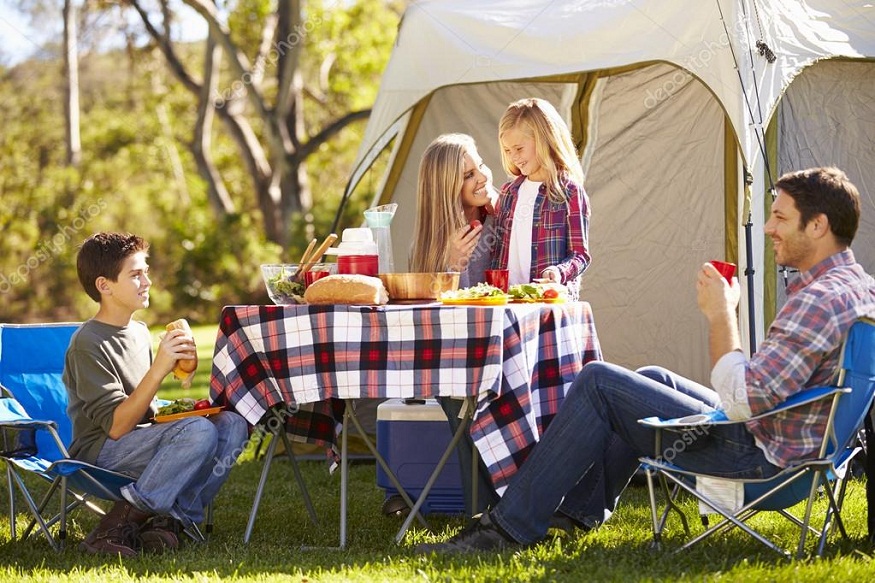Choose the ideal destination for your desires
Hikers? Solo or family vacation? Your temporary accommodation will depend on your family configuration and how you plan your stay! Define your needs and check the amenities and services available: showers, wi-fi, activities, children’s club, entertainment, pets allowed, swimming pools…
Traveling camping
Plan your budget to find and choose the ideal formula. Write down every potential cost of your stay: location, food, excursions, etc. If you have more than one option, also list them separately. The goal is to find the best option within your budget limit while making the right compromise.
Camping has evolved a lot in recent years and takes many forms. As a result, prices vary widely. Some campsites or holiday villages offer daily entertainment, have swimming pools worthy of water parks with bubble baths and giant slides . Others bet more on the natural and wild side. There is also very fashionable “glamping” (1) , a mix of top-of-the-range services and comfort. Do your research well before choosing!
Water park
2. Check traveler reviews
Take the time to read the opinions and comments of travelers before choosing your place of stay. The overall rating is often a good indicator of the establishment’s reputation. Also read traveler reviews but focus on the most recent and mixed reviews. The glowing reviews do not really provide any information if you have any doubts to decide. Very negative ratings, on the other hand, can be due to the bad luck of travelers at a specific time.
3. Anticipate reservations
Whatever the format: on a pitch to put up your tent or set up your motorhome, rented in a mobile home or bungalow, the watchword is: an-ti-ci-pa-tion!
When making your reservation, remember to find out about the possibility of arriving on Wednesday or Sunday to avoid traffic jams on Saturday. Many campsites offer staggered arrivals, especially in summer.
4. Check the accessibility of the campsite and choose a suitable mode of travel
Check the accessibility of your place of residence, this will allow you to choose a suitable mode of transport . Some campsites and holiday villages offer shuttle systems if you opt for the train or bus. For a family, the private vehicle will remain the best option.
In reality, there really isn’t a bad choice…budget and comfort should guide your decision. If you are traveling in a vehicle with a high carbon footprint, you can always leave it aside during your holidays in favor of walking or renting bikes !
5. Check the good condition of your equipment before leaving
Before departure, it is best to test your tent , your sleeping bag and your stove. Whether your equipment is new or old, this allows you to anticipate and avoid any problem on the day of your arrival at the campsite. It can be useful to have a good camper’s guide, to refer to when needed.
Travel equipment
6. For peaceful nights, take a flashlight and mosquito repellent
To respect the sleep of vacationers and the environment, most campgrounds turn off their lights at night. Remember to bring a flashlight that will be very useful!
Sleep in the tent
Summer is the season for mosquitoes… So that they don’t completely ruin your holidays, consider investing in a repellent spray or getting a good supply of citronella . If you are located near a lake, a swamp or in a mosquito region, consider installing a mosquito net on your tent or on the windows of your bungalow to avoid restless nights.
Also remember to take anything that can improve your sleep, even for the most luxurious camping options: pillows, mask, earplugs…
7. Plan simple meals and few dishes
picnic trips
During your stay, choose dishes that are simple to prepare . Whether you benefit from a kitchenette in a mobile home or take your stove, pasta and rice will be your best allies. Canned sardines and tuna also work well for a quick lunch. Remember to bring a cooler, stove and some kitchen utensils.
Disposable plates, glasses and cutlery are often part of the camper’s luggage, yet they represent a real danger for the environment. Remember to bring some dishes, especially if you are traveling by car, which you can easily wash. Replace your plastic water bottles with a water bottle

Be First to Comment